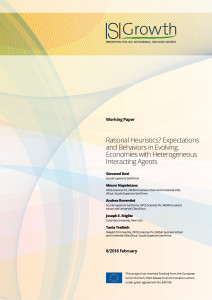We analyze the individual and macroeconomic impacts of heterogeneous expectations and action rules within an agent-based model populated by heterogeneous, interacting firms. Agents have to cope with a complex evolving economy characterized by deep uncertainty resulting from technical change, imperfect information coordination hurdles and structural breaks. In these circumstances, we find that neither individual nor macroeconomic dynamics improve when agents replace myopic expectations with less naïve learning rules. In fact, more sophisticated, e.g. recursive least squares (RLS) expectations produce less accurate individual forecasts and also considerably worsen the performance of the economy. Finally, our results suggest that fast and frugal robust heuristics are not a second-best option: rather they are “rational” in macroeconomic environments with heterogeneous, interacting agents and changing “fundamentals”.
Rational Heuristics? Expectations and Behaviors in Evolving. Economies with Heterogeneous Interacting Agents
Scuola Superiore Sant’Anna
Mauro Napoletano
OFCE-Sciences Po, SKEMA business school and Université Côte d’Azur, Scuola Superiore Sant’Anna
Andrea Roventini
Scuola Superiore Sant’Anna, OFCE-Sciences Po, SKEMA business school and Université Côte d’Azur
Joseph E. Stiglitz
Columbia University, New York
Tania Treibich
Maastricht University, OFCE-Sciences Po, SKEMA business school and Université Côte d’Azur, Scuola Superiore Sant’Anna

